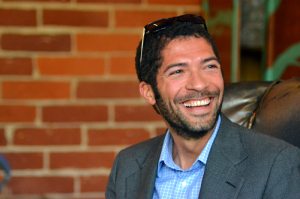Matt Delmont, assistant professor of American studies at Scripps College, never questioned Dick Clark’s claim that “American Bandstand” was racially integrated in the 1950s until Delmont’s research turned up new evidence. He chose to write a book about the popular TV show because it was one of his mother’s favorites, and he grew up listening to her memories of “American Bandstand.”
 “My research reveals how ‘American Bandstand’ discriminated against black youth during its early years and how black teens and civil rights advocates protested this discrimination,” Delmont says. “My book explains how ‘American Bandstand’ shaped the image of American teenagers while also becoming a battleground for segregation and civil rights.”
“My research reveals how ‘American Bandstand’ discriminated against black youth during its early years and how black teens and civil rights advocates protested this discrimination,” Delmont says. “My book explains how ‘American Bandstand’ shaped the image of American teenagers while also becoming a battleground for segregation and civil rights.”
In “The Nicest Kids in Town: American Bandstand, Rock ‘n’ Roll, and the Struggle for Civil Rights in 1950s Philadelphia,” (University of California Press: 2012), Delmont asserts that “American Bandstand,” the first national television program directed at teens, was out of step with desegregation. The book, released during Black History Month, also brings to light the civil rights activism of black deejays like Georgie Woods and Mitch Thomas, whose locally televised teen dance show debuted 15 years before “Soul Train” and influenced the dance styles on “American Bandstand.”
Delmont’s exhaustive research includes speech transcripts, government reports, census data, editorial cartoons, high school yearbooks, photographs, songs, popular histories of “American Bandstand,” and other original sources. He also interviewed 21 individuals who grew up in Philadelphia and attended, watched, or protested the TV show.
The book will be released Feb. 24. To schedule an interview with Delmont, please call Rosa Maria Santana at (909) 607-7177. Visit Delmont’s Web site to view early clips of “American Bandstand.”

